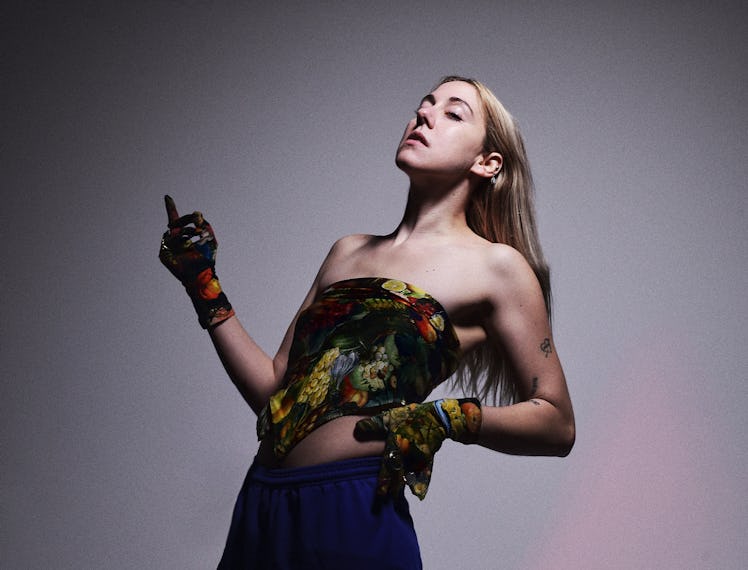Please Allow Torres to Reintroduce Herself—Again
The musician Mackenzie Scott emerges from a pandemic year with a new album that dares to imagine a self for whom pleasure and desire never run dry.

Mackenzie Scott had one clear objective. She did not, under any circumstances, want to bum people out. It was May of last year, two months into a pandemic that would stretch on for another year at least, and Scott, 30, who records as Torres, had recently begun working on material for a new album, “Thirstier,” which came out this past Friday. It’s an exuberant record, a soundtrack for plunging back into physical touch, filled with fantasies about what a world might look like if pleasure, joy, and desire never ran out. Or maybe, to borrow from one Stereogum commenter, it’s simply an album “about Olympian-level horniness.”
Writing new material from inside the first wave of the pandemic, though, Scott found that filling her songs with brash sounds and uplifting lyrics became “an exercise in my own ability to persuade,” she said. We video chatted on a July afternoon; Scott appeared from the Brooklyn apartment she shares with the painter Jenna Gribbon, 42, her partner of nearly four years. Behind her, a piece that Gribbon created as a proposal—“marry me baby” in washes of blue cursive against a multicolored swirl—hung on the wall. (They were engaged in October: “Obviously, I said yes,” Scott wrote on Instagram.)
“It’s sort of my job to suspend disbelief for the listener,” Scott went on. She has wrestled with anxiety, and her earlier work often addressed themes of loneliness and unrequited attraction that she didn’t think would be productive in the moment. “My challenge was first and foremost to do that for myself—to see if I could actually convince myself of what I was trying to make other people feel, which was energized in the midst of all that anxiety, fear, and uncertainty.”
“Did you succeed?” I asked.
“In a way. I think I succeeded long enough to make the thing,” Scott replied. “I’m always trying to transcend whatever my actual reality is,” she added. “I get bored. That’s why I make things—to make a world for myself and then occupy it for a little while.”
Across her first four albums, Scott acquired a reputation for reinvention: On her self-titled first record in 2013, she styled herself a contemplative singer-songwriter; on 2017’s “Three Futures,” a Lynchian surrealist. “Thirstier” represents yet another distinct departure, with more direct lyrics and a pop sound. (The critic Lindsay Zoladz wrote that the lead single “Don’t Go Puttin Wishes in My Head” “might be the most accessible thing she’s ever released. And she knows it.”) On the cover, which Gribbon painted, Scott is splayed, her guitar cradled between her legs. “I had this idea that the image should have an iconic pop appeal to it,” Gribbon told me later. The whole thing is bathed in shades of red, leaving the viewer desiring “more detail, more clarity, more visibility,” she added—and echoing the album’s themes of always desiring more.
The record required Scott to take a different tack in writing lyrics. Where in the past she often labored over the layers of meaning in her songs, here, her process was more immediate. “Whatever the first lyrics were that spilled out of my guts,” she told me, “I tried to utilize those.” She cited the song “Drive Me,” whose first six lines begin with the words, “drive me…” She worried, at times, about how such a song would be received. “I was like, ‘Ugh, is that so cheesy it’s going to be in a car commercial?’” she said.
Look closer, though, and you’ll find “Thirstier” has depth. On the title track, an ’80s-style anthem, Scott howls, “the more of you I drink, the thirstier I get,” before going on, in a hushed tone, “I’ll admit that sometimes, I’m afraid that you’ll still run / aim and shoot your arrow at a new obsession.” I suggested that, in making a record about the idea of never running out of desire, Scott was also talking about its inverse—the anxiety that that desire will someday be depleted. She paused. “That’s at the heart of my deepest insecurities,” Scott said. “I’m particularly very anxious around the idea of losing my joy.” (It also echoes her “fear of not accomplishing my dreams—of lusting after a life I can’t obtain,” she added later, over email. “Different thing, but they feel related.”)
Although it emerged out of the pandemic (look no further than the opening verse of “Keep the Devil Out,” which conjures the claustrophobia of lockdown and was among the first songs written for the record), “Thirstier” is also the product of changes in Scott’s own life. Part of it was just getting older—“there’s a very natural, slow self-actualization that happens,” she said —and part of it was beginning virtual therapy last year.
But most of all, it was her relationship with Gribbon. (“Almost every song I write is about Jenna in some way,” Scott recently told CBS.) They had moved in together in the summer of 2019, and their relationship became sturdier. “It just took a long time for us to get on the same page about where we were going,” Gribbon said. “Once we did, it was great, because I think we are both really good at imagining possible futures.” They were engaged shortly before Scott departed for Devon, England, where she spent six weeks from October to December recording “Thirstier.”
The record, then, is emblematic of a larger shift in Scott’s outlook—refocusing the “doomsday lens” of her anxiety onto more positive thoughts and conversations. “When you speak something into the universe, you’re speaking something into existence,” Scott said. “What you put out is what you attract.”